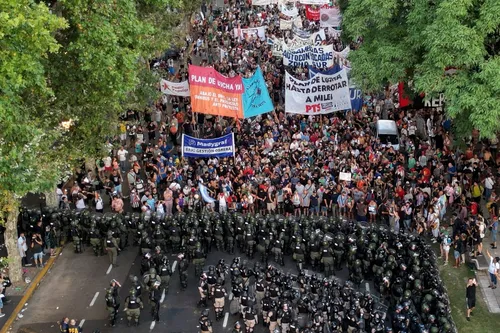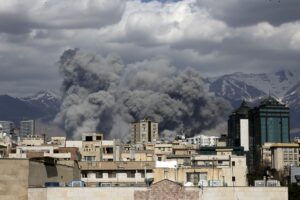
The Argentine Congress is expected to resume the debate on President Javier Milei’s ultraliberal package at noon this Thursday (1) after it was interrupted on Wednesday night (31). Since the beginning of discussions, at least 4 provinces have registered protests against the measure.
Until voting resumed, more than 100 articles were removed from the project and just over half were maintained. The announced package had, in total, 664 topics. Deputies paused voting after an 11-hour session and 140 deputies still need to vote. Members of La Libertad Avanza, Milei’s coalition, celebrated the result of the 1st day of debates
The country registered protests in Buenos Aires, Jujuy and Paraná. The demonstration in the capital was repressed by police officers in the afternoon. Four women were arrested in front of Congress at night for sitting on Rivadavia Avenue and singing the national anthem. Federal Police agents surrounded and dragged the group to a corporation van.
In Mendoza, a leader of the Workers’ Party was arrested after participating in a protest against the measures. He was accused of failing to comply with article 194 of the Penal Code, which is part of Javier Milei’s “anti-picketing” package, for “obstructing the operation of transport”.
One of the leaders of the Argentine General Confederation of Labor (CGT), Pablo Moyano, did not rule out the possibility of calling for another strike if the project “advances against the Argentine people”.
ultraliberal package
The so-called Bus Law attempts to concentrate legislative powers in the Executive, in addition to interfering in all social and economic aspects of the country. It also determines:
1. Privatization of all public companies, without exceptions. Included are companies that had been excluded in the 90s, such as Banco Nacional. This was negotiated and would now not include major companies like YPF.
2. Criminalization of social protest at unprecedented levels since the return of democracy.
3. Energy deregulation and liberalization: oil, gas, biofuels and electricity.
4. Removal of criteria established after the 2001 default to prevent new fraud with public debt.
5. Elimination of the Sustainability Guarantee Fund, something that harms retirees;
6. Tax reduction for the richest.
Editing: Lucas Estanislau
Source: www.brasildefato.com.br

